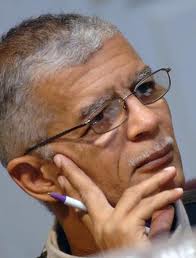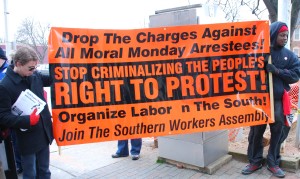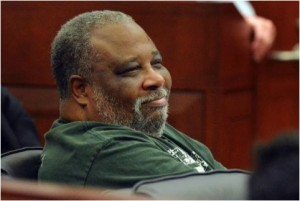 We are gathered here in Jackson, Mississippi and throughout the country, as we mourn the transition of our Comrade, brother, friend, and member of our family Comrade Chokwe Lumumba. As we observe his body Laying in State, an honor befitting of a Freedom Fighter, and fighter for human rights, we offer our sincere condolences to the Lumumba family.
We are gathered here in Jackson, Mississippi and throughout the country, as we mourn the transition of our Comrade, brother, friend, and member of our family Comrade Chokwe Lumumba. As we observe his body Laying in State, an honor befitting of a Freedom Fighter, and fighter for human rights, we offer our sincere condolences to the Lumumba family.
Comrade Chokwe was part of the Black liberation movement. It anchored him in the struggles against forces and systems that cause the oppression and suffering of people of African descent in the U.S. and all oppressed and exploited peoples throughout the world. He was a revolutionary human rights fighter struggling with others to create a better world.
Whatever Chokwe did, whether it was as a father, a basketball coach, a people’s lawyer or the leader of a revolutionary organization, he selflessly put his heart into it.
Comrades jailed and placed in torturous solitary confinement for long periods of time and forced into political exile resulting from their actions in fighting against the forces of oppression, trusted Chokwe to take their cases. They knew that he treated the courts like another battleground in the struggle for liberation.
In 2005, the devastation in the Gulf caused by Hurricanes Katrina and Rita and the failure of the federal government to deal with repairing the substandard levees in New Orleans, caused the flooding of over 100,000 homes and businesses. This was compounded by a strategy of ethnic cleaning seeking to eliminate the Black majority. Comrade Chokwe and the Malcolm X Grassroots Movement (MXGM) were instrumental in hosting the National Survivors Assembly in Jackson. Several hundred survivors dispersed to cities across the U.S. attended the National Survivors Assembly to represent the hundred’s in those cities to participate in developing the demands and a program to launch a Reconstruction Movement.
Katrina/Rita Survivor Assemblies were the initial organizing bodies for Survivors in the various cities before and after the National Survivors Assembly. They connected the Survivors and their allies to the Gulf Coast Reconstruction Movement that engaged in many battles against federal, state and local government and white supremacist attacks on the people. What we referred to today as the Jackson Peoples Assembly grew out of the Jackson Survivors Assembly of the Gulf Coast Reconstruction Movement.
When Chokwe decided to run for the Jackson City Council, the People’s Assembly became part of the framework for building democratic people’s governance in his City Council district. The People’s Assemblies are consistent with the aims of the unfinished Gulf Coast and South wide Reconstruction Movement and represent a fundamental aspect of the struggle for self-determination to build and exercise democratic people’s power and control over the economic, social and political resources, and to contribute to setting a new direction for struggles throughout the country. “The People Shall Decide” slogan of Comrade Chokwe’s mayoral campaign epitomizes the democratic principles of the demand for self-determination.
The Jackson-Plan, a basic program and vision that Comrade Chokwe and the MXGM sought to organize the social movements, mass organizations, institutions and the people around, was critical to creating a political climate that would enable the Chokwe administration to push the Jackson city government forward in implementing aspects of the Plan’s transitional program.
The very talk about a people’s solidarity economy, the plans to hold an economic conference in Jackson on worker cooperatives, and supporting the 50th Anniversary of the Mississippi Freedom Summer Project that will bring many old and new Freedom Fighters back into Mississippi, made clear that the Chokwe administration was not planning on carry out business as usual.
There was great excitement among revolutionary and progressive forces in movements and governments throughout the U.S. and internationally, about the election of Comrade Chokwe. They recognized the importance of the City of Jackson as a new battlefront in Mississippi and the South for the Black liberation movement led program for people’s democratic governance. With 31% of the US Gross National Product (GNP), the combined Domestic State Products of the South is $3.73 trillion, making it the world’s fourth largest economy following Japan. It is a strategic region for U.S. and global capitalism and for a major part of the U.S. imperialist military industrial complex.
Comrade Chokwe’s election as Mayor of Jackson occurred in the current period of growing mass resistance developing throughout the South and nationally challenging the corporate financed right-wing takeover of state governments. The attacks on the policies, gains and organizations that provide basic democratic protections against social and political oppression and worker exploitation, is the program of corporate power to place the burden of the economic crisis on the working-class and the poor. The Chokwe administration and the Jackson-Plan were becoming positioned to contribute to the further shaping of this mass resistance that is being promoted by social movements like Moral Mondays.
While the Chokwe administration and the Jackson-Plan would represent part of the defensive struggle, it offered the potential as a battlefront for the beginning of a counter-offensive. This counter offensive can establish a direction of building bases for democratic people’s governance and self-determination toward shaping an alternative to the exploitation, social decay and human suffering of the capitalist system.
The transition of Comrade Chokwe Lumumba, while a great loss for this new battlefront, must also be a clarion call for the redoubling of our efforts to unite the forces of the Black liberation and the people’s movements for human rights and revolutionary change to press forward. We must help to further build and support this new battlefront in carrying forward Comrade Chokwe Lumumba’s vision and spirit of Dare to Struggle, Dare to Win!
Comrade Chokwe this is not the end, we will be together in the Revolutionary World Win!
Presente!
Black Workers For Justice
March 7, 2014






